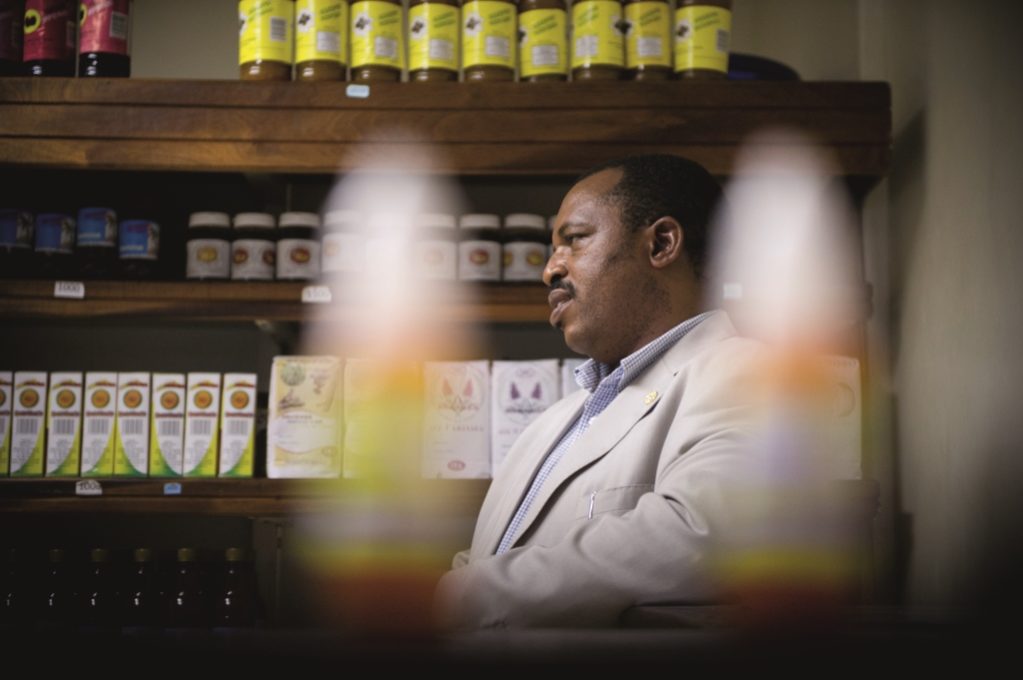In 1983, Gerard Sina, who didn’t finish school, set about trying to make something of his life. He lived with his parents on a farm, in a small town called Nyirangarama, in Northern Rwanda. One day, it dawned on him that the travelers between Rwanda’s two biggest cities—the capital Kigali and Gisenyi in the West—had nowhere to stop for refreshments during their four hour journey. He set up a small stall of baked goods that he sold to tired and hungry travelers.
Sina used a simple, but effective, marketing method to entice patrons. He offered travelers free samples of his food. Unable to resist, they quickly become accustomed to a place to get second wind on their journey. Soon the roadside stall became a regular fixture on the well-traveled route.
Then Sina found a way to produce his baked goods at a more industrial level. His little roadside stall became a 24-hour pit stop. Now travelers were flocking in around the clock. Whatever Sina lacked in formal education, he made up for in raw business talent.
His second stroke of genius came in 1999, when he discovered the riches that lay within the belly of the passion fruit. He developed a new method to extract juice to make concentrated syrup that he bottled and sold in bulk. Today, Agashya, literally translated as ‘something new’, is the first of Sina’s iconic Rwandan brands.
The second creation was Akabanga. ‘The secret’ is an oil-based chilli sauce that has changed the way that Rwandans eat. Before Akabanga, Rwandese food was traditionally bland, seasoned only lightly with salt and some herbs, but today Akabanga is a fixture on the dinner tables of the country.
These products, which are also exported in small quantities to the rest of the East African Region, Europe and North America, have set him on the way to recognition. His mother company, Urwibutso Enterprise, won bronze for Best Exporter at the Rwanda Development Board Awards in 2009. The ceremony is held annually to pay homage to the best performing companies in the various Rwandan industries.
Sina has been the recipient of several other awards including; the Arch of Kigali in the gold category for technology and quality in 2006 in Frankfurt, the Legatum Pioneers of Prosperity Awards for Entrepreneurship in 2007 in Kigali, and more recently in 2011 in London at the Business Initiative Direction Award in the diamond category for business management, excellence, quality, technology, innovation and expansion.
Along with an eye for business, Sina has an inquisitive nature.
On a trip across Europe, Sina saw some farmers playing music to their pigs. Intrigued, he reasoned that music makes people happy and brightens even the dullest moments, so the same could be true for pigs. When he returned to Rwanda he set about experimenting with his own pigs. He went as far as having a control group of pigs that were not exposed to music during the experiment period.
He found that the pigs that were exposed to music were indeed happier at the end of the experiment; they ate more, grew faster and fell ill less often than the ones in the control group. Now, he plays music to his pigs every day.
On another trip to Europe, he visited a vineyard and an orchard, again intrigued; he decided to grow apples and grapes, fruits that are not found in Rwanda. He now makes red wine and supplies apples to stalls in the local produce market.
Another quintessential African solution that Sina has adapted from his many travels is to ensure that he always uses locally grown raw materials. Having lived the life of a small scale farmer himself, he knows the day-to-day hardships that they often face. The count of local farmers he employs is 3,000 and growing. He trains them and provides seeds and fertilizer and in return they sell their crops exclusively to him.
Gerard Sina shows his allegiance to Rwanda and to her culture in many ways, the most notable being the naming of his products—they all have Rwandese names. He wants people in the export destination countries to marvel at these exotic names and to ask “what language is that?” or “what does that mean?”, thus creating a mystical aura around Rwanda and her people.
All of this in a country that wants to develop its information and communications technology (ICT) sectors to become the Singapore of Africa, and move away from farming.
“Agriculture comes first, because the most successful countries are those where people can eat,” he says.
Sina’s journey through life and business has not always been easy. During the 1994 genocide his young business was completely destroyed, he lost everything but the land where he toiled. Since he has always believed that giving up is an act of cowardice, building his business back up from scratch was something that simply had to be done.
His advice for young people who are rebuilding Rwanda is to not be afraid to share ideas and add value to Africa’s raw materials. For Africa as a whole, Sina believes that the answer to prosperity on the continent lies in adding value to raw materials.
“Do not just grow strawberries to sell them at the market. Make jam, juice, yogurt and cosmetics. This way, more can be charged for the finished product and more profit can be made. This profit can then be used as additional capital for the business and to provide a better life for all involved,” he says.
This approach has contributed greatly to Urwibutso Enterprises, making profits around the million dollar mark in the past two, very difficult, post-recession years.
Sina is adamant that Africans should take a page out the West’s book. More emphasis should be put into becoming self-reliant, rather than relying on international aid. He would rather not give his fellow Africans fish, but teach them how to fish. That way they will never go hungry.
